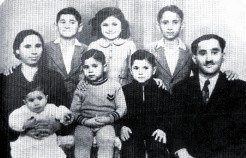Batrcop.com> RFK Assassination Page> Sirhan SirhanSirhan Sirhan
Sirhan Bishara Sirhan was born March 19, 1944, in Jerusalem, Palestine, the fifth son of Bishara and Mary (Muzher). The family practiced Jordanian Christianity, but belonged to the Arab-based society in the divided region. As a child, Sirhan saw the state in which he lived blistered by upheaval – he saw entire villages dissipated in the Jewish-Arab war. He would be 12 years old before his family earned U.S. visas and, as Palestinian refugees, arrive in the New World. Living briefly in New York City, the Sirhans eventually moved west to California.
Sirhan family in 1946. Mary is hold infant Sirhan Sirhan
(Mangan Collection)
According to investigative writer Dan E. Moldea in The Killing of Robert F. Kennedy, young Sirhan was abused as a boy by his father, who seemed unable to understand American customs and, therefore, grew resentful of this new life. Deserting his wife and family, he eventually returned to his homeland. Mary Sirhan, faced with the prospect of raising her children by herself, got a job as a teacher’s aide in a Pasadena nursery school and, by all accounts, worked hard and learned fast.
Her son Sirhan was quiet and polite, a good student, and had many friends. At John Muir High School, he studied two difficult languages, German and Russian, and, as a side activity, joined the California Cadets, "a type of high school ROTC," as Moldea explains. He enjoyed the Cadets’ occasional trips to the National Guard Armory, where students were allowed to shoot .22 caliber rifles at practice targets.
In 1963, Sirhan Sirhan enrolled in City College, but generally ducked, instead hanging out at a local Denny’s restaurant with fellow AWOLs. His college education slid; he quit in early 1965 when his sister Aida, whom he adored, was stricken with leukemia.
Sirhan worked frequently, but at low-paying jobs – as a salesman for a health food store or a groomsman at the Santa Anita Racetrack. He loved the latter and wanted very badly to become a jockey. Although his small physical stature was ideal, he lacked the nerve, according to an acquaintance. After a series of horse-riding accidents, which sent him to the hospital, his career dreams ended. Nevertheless, Sirhan continued to hang out at the track, sometimes betting away his entire check on one or two races. The most money he purportedly owned at any one time was a $1,700 settlement check after falling off a horse. Of possessions, his only one was a 1956 DeSoto.
Religiously, his doctrines changed often, the ones holding the longest interest being Baptist, Seventh Day Adventism and several forms of occultism.
"As an alien, Sirhan did not have the right to vote in America," Moldea says. "Although he felt strongly about the Middle East situation and expressed the belief that he was ‘disenfranchised from the American establishment,’ Sirhan did not belong to a political party. But (it appeared that he) supported the Baath Party, which operated in the Middle East."
As for his motive in killing Robert Kennedy, the SUS sought that amid the lines of scratch on the pages of his notebooks. Scrawlings between their covers brought hard accusation. They read, "RFK must die," "Robert F. Kennedy must be assassinated before June 5, 1968," and "My determination to eliminate RFK is becoming more (and) more of an unshakable obsession…(He) must be sacrificed for the cause of the poor exploited people."
Through witness interviews, the SUS discovered that Sirhan had attended two previous Kennedy assemblies. One fellow remembered seeing Sirhan at one, looking "completely out of character…very intense and sinister." And another person placed him at a June 2 speech, two days before the assassination.
The overall finding of the SUS, is defined in this excerpt: "Sirhan was a self-appointed assassin. He decided that Bobby Kennedy was no good because he was helping the Jews. And he was going to kill him."
Batrcop.com> RFK Assassination Page> Sirhan Sirhan
